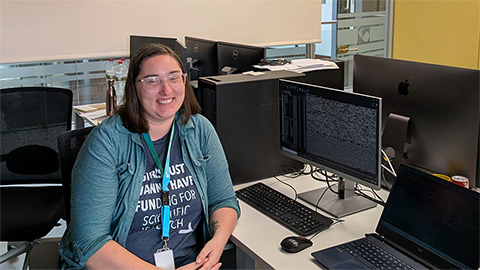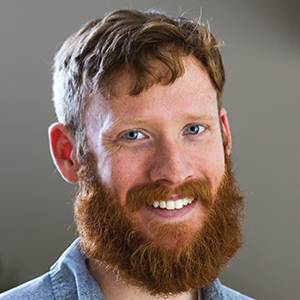Science communication in action: COVID-19 edition
There's a flood of information out there about the COVID-19 pandemic. Here are some the best articles and multimedia we've seen so far.

2019 novel coronavirus mini-course (Shauna Bennett and Elfy Chiang, Lifeology)
This illustrated primer, aimed at people with little knowledge of health and science topics, is simple, easy to follow, and not alarmist. Good for kids. Available in a growing number of languages.
Diaries of a coronavirologist (Stuart Weston, Youtube)
In another example of direct-to-the-public science communication, postdoctoral researcher Stuart Weston, who works in a coronavirus lab at the University of Maryland School of Medicine, has launched the YouTube channel “Diaries of a coronavirologist” to discuss his research and help cut through misinformation about COVID-19.
How coronavirus hijacks your cells (Jonathan Corum and Carl Zimmer, The New York Times)
Elegance often comes from simplicity. The Times has put together the most straightforwardly stunning visual of how the coronavirus enters cells and bends their machinery to its bidding.
How soap absolutely annihilates the coronavirus (Brian Resnick, Vox)
The article is good, but the video is even better: It combines simple sciart graphics explaining why amphiphilic soap works better than water alone with a visualization of the effects of 5, 10 and 20 seconds of handwashing on a UV-visible lotion. Plus, there’s a list of handwashing ditties in case yours have gotten tiresome.
How testing for COVID-19 works (Siouxsie Wiles, The Spinoff, New Zealand)
This excellent hand-drawn graphic illustrates the differences in symptoms between COVID-19, the flu and a common cold. We’ve all got a little hypochondria these days, but try to stay calm and reserve tests for people who need them!
My coronavirus test: five days, a dozen calls, hours of confusion (Tim Herrera, The New York Times)
Across Twitter and countless columns, the same story appears, with only slight variations: I knew I was sick, nobody could tell me what to do, and it took heaven and earth to get tested (with many folks not being able to get tested at all).
What went wrong with coronavirus testing in the U.S. (Robert Baird, The New Yorker)
In mid-February, the technical problems with the CDC's coronavirus test primers seemed to barely warrant a second notice. "Another round of primer optimization," we said at the ASBMB office, deciding it wasn't newsworthy. A month later, the government's failure to roll out accurate testing in a timely way is a national disgrace. This detailed, policy-focused explainer describes how we got from there to here.
Chloroquine may fight COVID-19—and Silicon Valley’s into it (Adam Rogers, Wired)
First came the tweets; then came the tech bros. In this masterful deep dive, Wired's Adam Rogers digs into the history of chloroquine and casts the tech world's very recent embrace of the old malaria drug as a hail Mary cure for COVID-19 as emblematic of Silicon Valley's fast, sometimes careless, nature.
Why outbreaks spread exponentially, and how to “flatten the curve” (Harry Stevens, The Washington Post)
This simulator shows visually why reducing social contact is good for everyone, and why “flatten the curve” has become such a buzzy instruction.
Cancel everything (Yascha Mounk, The Atlantic)
While many of us have taken social distancing to heart, working from home and disengaging from much of the outside world, this Atlantic story rings loud for everyone in the back of the room (and the beaches and the bars): Cancel your plans. Cancel everything.
Enjoy reading ASBMB Today?
Become a member to receive the print edition four times a year and the digital edition monthly.
Learn moreGet the latest from ASBMB Today
Enter your email address, and we’ll send you a weekly email with recent articles, interviews and more.
Latest in Opinions
Opinions highlights or most popular articles

Women’s health cannot leave rare diseases behind
A physician living with lymphangioleiomyomatosis and a basic scientist explain why patient-driven, trial-ready research is essential to turning momentum into meaningful progress.

Making my spicy brain work for me
Researcher Reid Blanchett reflects on her journey navigating mental health struggles through graduate school. She found a new path in bioinformatics, proving that science can be flexible, forgiving and full of second chances.

The tortoise wins: How slowing down saved my Ph.D.
Graduate student Amy Bounds reflects on how slowing down in the lab not only improved her relationship with work but also made her a more productive scientist.

How pediatric cataracts shaped my scientific journey
Undergraduate student Grace Jones shares how she transformed her childhood cataract diagnosis into a scientific purpose. She explores how biochemistry can bring a clearer vision to others, and how personal history can shape discovery.

Debugging my code and teaching with ChatGPT
AI tools like ChatGPT have changed the way an assistant professor teaches and does research. But, he asserts that real growth still comes from struggle, and educators must help students use AI wisely — as scaffolds, not shortcuts.

AI in the lab: The power of smarter questions
An assistant professor discusses AI's evolution from a buzzword to a trusted research partner. It helps streamline reviews, troubleshoot code, save time and spark ideas, but its success relies on combining AI with expertise and critical thinking.


